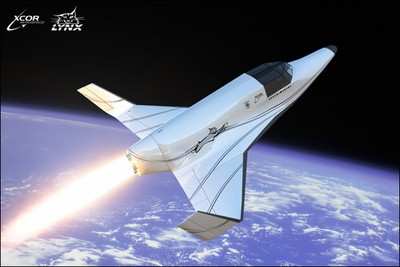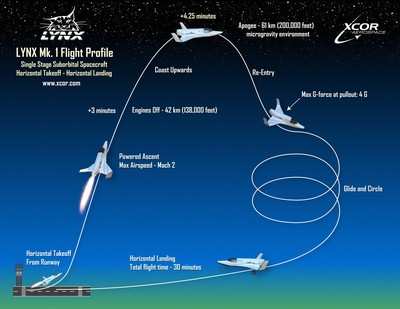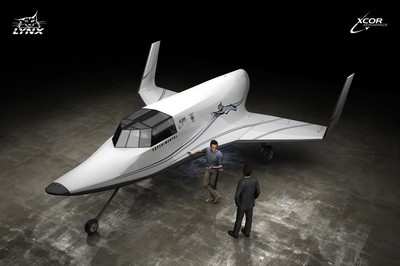Lynx Two-Person Ship To Fly In 2010
A small California aerospace company unveiled Wednesday a new,
self-contained, suborbital spaceship, designed to provide
affordable front-seat rides to the edge of space for the millions
of people who want to buy a ticket.

The company, XCOR Aerospace, of Mojave, CA, announced its
two-seat Lynx suborbital spaceship will carry people or payloads to
where they will experience weightlessness... and see the stars
above and the Earth and its atmosphere below.
Unlike Virgin Galactic's SpaceShipTwo project, also slated to
enter service in 2010, the smaller Lynx will not rely on a separate
launch vehicle to ascend skyward... but will instead take off like
a conventional, albeit rocket-powered, aircraft, then climb
skyward. Following approximately five minutes in weightlessness,
Lynx will glide down to Earth, and land in a similar manner to
NASA's space shuttle.
This will launch XCOR into the emerging space tourism market,
estimated at over a half-billion dollars.
"The Lynx will offer affordable access to space for individuals,
researchers and educators," said XCOR CEO Jeff Greason. "Future
versions of Lynx will offer ever-improving capabilities for
scientific and engineering research and commercial applications.
The spaceship, roughly the size of a small private airplane, will
first take off in 2010 and will be capable of flying several times
each day.

"We have designed this vehicle to operate much like a commercial
aircraft. Its liquid fuel engines will provide the enhanced safety,
durability, reliability and maintainability that keep operating
costs low," Greason said.
"These engines will also minimize the impact of these flights on
the environment," Greason added. "They are fully reusable, burn
cleanly, and release fewer particulates than solid fuel or hybrid
rocket motors."
"Lynx will be the 'Greatest Ride Off Earth,'" said XCOR test
pilot, former pilot astronaut and Space Shuttle commander, Col.
Rick Searfoss (USAF-Ret.). "The acceleration, the weightlessness,
and the view will provide you with an experience that is out of
this world. And the best part of it all is that you'll ride right
up front, like a co-pilot, instead of in back, like cargo."
XCOR has nine years' experience developing reliable, reusable
and non-toxic rocket propulsion systems, and has already built and
flown two different rocket-powered vehicles. The firm designed,
built and flew a rocket propulsion system on its record-setting
EZ-Rocket aircraft. The XCOR team then developed a more powerful
engine with an advanced pump-fed fuel system for a larger aircraft,
now being flight-tested for a commercial customer.

"The Lynx builds on our track record in rocket-powered
vehicles," Greason said. "By addressing profitable near-term
markets, the Lynx will strengthen the financial and technical
foundation for increasingly capable future spaceships for
suborbital and orbital markets." "XCOR's mission is to radically
lower the cost of spaceflight, because affordable access to space
for everyone means far more than breathtaking views and the freedom
of weightlessness," said Greason. "It means unlocking the material
and energy resources and economic opportunities of our solar system
for our children."
 Aero-News: Quote of the Day (04.28.25)
Aero-News: Quote of the Day (04.28.25) ANN's Daily Aero-Term (04.28.25): Decision Altitude (DA)
ANN's Daily Aero-Term (04.28.25): Decision Altitude (DA) ANN's Daily Aero-Linx (04.28.25)
ANN's Daily Aero-Linx (04.28.25) Airborne-Flight Training 04.24.25: GA Refocused, Seminole/Epic, WestJet v TFWP
Airborne-Flight Training 04.24.25: GA Refocused, Seminole/Epic, WestJet v TFWP Aero-News: Quote of the Day (04.29.25)
Aero-News: Quote of the Day (04.29.25)





